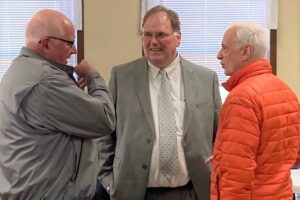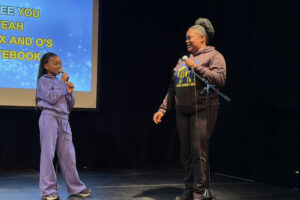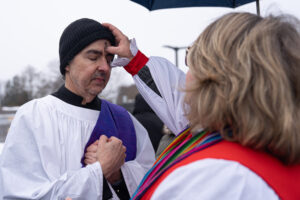Mohawk students must leave their nation to attend high school
Akwesasne is a nation without a high school

Tara Skidders opened the door to a small classroom. She stopped at the entrance when she saw the pens, papers and craft supplies students left on their desks from Friday’s class.
She shook her head and laughed, eager to show the decorations and student work displayed in the room. Everything inside – from the charts and posters hanging on the walls to the school schedule outlined on the board – was in Kanien’kehá, the traditional Mohawk language.
There wasn’t a trace of English in sight.
“These are our pronouns,” Skidders said, pointing to a poster with drawings of people to show 15 pronouns in Kanien’kehá. “And that’s only 15. There’s actually a few more.”

This is a typical classroom in the Akwesasne Freedom School, one of five immersion schools for Mohawk youth living in Akwesasne, a territory that straddles the U.S.-Canada border. These schools were created to revive Mohawk language and culture after previous generations were forced to attend residential schools, a system that made Native people eradicate their own culture and assimilate into Western ways of living.
Despite this revival, immersion schools for Mohawk youth only go up to eighth grade. In fact, there’s no high school at all in Akwesasne, a more than 33-square-mile territory with about 23,000 residents. The lack of a secondary school is due in part to the territory being divided by the U.S.-Canada border, requiring two different elected tribal councils, the St. Regis Mohawk Tribe on the U.S. side and the Mohawk Council of Akwesasne on the Canadian side.
The many jurisdictions of Akwesasne — which translates as “Land Where the Partridge Drums” – complicates its education system, among other things. Some Mohawk youth are satisfied with the current system because it opens doors to life outside Akwesasne. But Skidders and others think it’s time for a high school at Akwesasne.
Skidders, the Freedom School’s director, dreams of adding a high school program that will teach students traditional Mohawk skills such as fishing, hunting, using medicines and growing plants, along with speaking Kanien’kehá, which only 30 percent of people from Akwesasne can speak. “We’re always trying to focus on what we can keep going,” she said.
Skidders’ parents helped start the school 40 years ago after a land dispute between the Mohawk community and the New York State Police. Eventually, a group of parents decided they no longer wanted to send their children to school in a state they were fighting with, she said. Instead, they wanted to have control over their children’s education.
Today, the Freedom School serves 72 students in kindergarten to eighth grade. The private school requires all students to learn and speak in Kanien’kehá and follow a curriculum based on Mohawk teachings, such as Ohen:ton Karihwatehkwen (Words Before All Else), the Mohawk people’s invocation of the natural world.
Skidders wants to continue this curriculum past eighth grade because she doesn’t want her students to forget what they learn once they transfer to a school in the U.S. or Canadian school systems. She also said she has students who struggle adjusting to a new school system because the curriculums and classroom environments are different. For example, some students may struggle with writing essays and research papers in their English classes because they didn’t spend much time learning those skills in a Mohawk immersion school.
Stephanie Cook, the director of the Saint Regis Mohawk Tribe’s education division, said that students living in Akwesasne have many choices for education. But there has never been a formal plan in place to start a high school on the reservation, she said. Students can either attend an immersion school on the territory or enter the U.S. or Canadian school systems because the Akwesasne tribal councils already have tuition agreements with certain schools nearby.
Students living in Akwesasne who attended an immersion school can transfer to Massena Central High School or Salmon River High School in New York or Cornwall Collegiate and Vocational School (CCVS) in Ontario. Due to high numbers of Mohawk youth attending these high schools, there are government-funded cultural programs and academic services that cater to their specific needs.
Some in the community are critical of these partnerships because these schools still prioritize Western education. Chelsea Sunday is an organizer for Ohero:kon (Under the Husk), a rites of passage ceremony that Mohawk youth volunteer to participate in. She’s also a strong advocate for going back to traditional ways of learning in her community, especially as someone who grew up attending non-Native schools her whole life.
Sunday explained that the Mohawk people’s traditional way of learning is like giving birth to a child who would hear Kanien’kehá directly from her voice. “It would learn how to navigate the world, and it would be through me and my relatives,” she said.
For example, rather than only learning Western subjects like math or language arts or focusing on standardized testing and grades, Sunday wants youth in her community to learn from their elders how to catch food, navigate waterways, use traditional medicines and speak in their language.
Sunday said that when a Mohawk person attends school in the U.S. or Canadian system, they’re essentially learning about being a U.S. or Canadian citizen first. When they return to Akwesasne, they’re instilling those values into the rest of the community.
“It’s no longer our oppressor oppressing and assimilating us, it’s our own people,” Sunday said. “We had our own way of being. We had our own way of thinking.”
But starting a high school in Akwesasne is no small feat.













